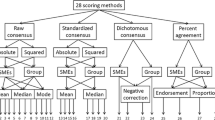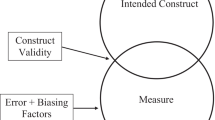Abstract
Purpose
This paper describes the development of a situational judgment test (SJT) based on single-response options developed directly from critical incidents and reports a study that tested the SJT’s concurrent validity against ratings of job performance.
Design/Methodology/Approach
Situational judgment test items were developed from critical incidents provided by administrators of volunteer agencies. Volunteers who worked at another agency completed the SJT and a self-report personality test. Supervisors rated their job performance on three dimensions.
Findings
Situational judgment test scores representing procedural knowledge about work effort were significantly correlated with ratings of work effort performance (r = .28). Conscientiousness was correlated with work effort knowledge (r = .26), but not with work effort performance (r = −.02).
Implications
These results provide some preliminary evidence that a single-response SJT format based upon critical incidents can produce valid measures of procedural knowledge and might be a useful alternative to the traditional multiple-response format.
Originality/Value
This paper presents a novel way to construct SJTs using single-response options that are less laborious to develop than the multiple-response options in traditional SJT formats. Results of the validity study suggest that this new single-response format can predict job performance and encourage further research on the viability of this approach.
Similar content being viewed by others
References
Chan, D., & Schmitt, N. (2002). Situational judgment and job performance. Human Performance, 15, 233–254. doi:10.1207/S15327043HUP1503_01.
Flanagan, J. C. (1954). The critical incident technique. Psychological Bulletin, 51, 327–358. doi:10.1037/h0061470.
Goldberg, L. R., Johnson, J. A., Eber, H. W., Hogan, R., Ashton, M. C., Cloninger, C. R., et al. (2006). The international personality item pool and the future of public-domain personality measures. Journal of Research in Personality, 40, 84–96. doi:10.1016/j.jrp.2005.08.007.
McDaniel, M. A., Morgeson, F. P., Finnegan, E. B., Campion, M. A., & Braverman, E. P. (2001). Use of situational judgment tests to predict job performance: A clarification of the literature. The Journal of Applied Psychology, 86, 730–740. doi:10.1037/0021-9010.86.4.730.
McDaniel, M. A., & Whetzel, D. L. (2007). Situational judgment tests. In D. L. Whetzel & G. R. Wheaton (Eds.), Applied measurement: Industrial psychology in human resources management (pp. 235–257). New York: Erlbaum.
Motowidlo, S. J., Dunnette, M. D., & Carter, G. W. (1990). An alternative selection procedure: The low-fidelity simulation. The Journal of Applied Psychology, 75, 640–647. doi:10.1037/0021-9010.75.6.640.
Smith, P. C., & Kendall, L. M. (1963). Retranslation of expectations: An approach to the construction of unambiguous anchors for rating scales. The Journal of Applied Psychology, 47, 149–155. doi:10.1037/h0047060.
Weekley, J. A., Ployhart, R. E., & Holtz, B. C. (2006). On the development of situational judgment tests: Issues in item development, scaling, and scoring. In J. Weekley & R. Ployhart (Eds.), Situational judgment tests: Theory, measurement, and application: SIOP Organizational Series (pp. 157–182). Mahwah, NJ: Lawrence Erlbaum Associates.
Acknowledgments
We gratefully acknowledge Fred Oswald for offering many helpful comments and suggestions on an earlier draft of this manuscript.
Author information
Authors and Affiliations
Corresponding author
Additional information
Received and reviewed by former editor, George Neuman.
Rights and permissions
About this article
Cite this article
Motowidlo, S.J., Crook, A.E., Kell, H.J. et al. Measuring Procedural Knowledge More Simply with a Single-Response Situational Judgment Test. J Bus Psychol 24, 281–288 (2009). https://doi.org/10.1007/s10869-009-9106-4
Published:
Issue Date:
DOI: https://doi.org/10.1007/s10869-009-9106-4




